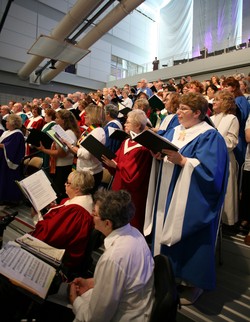This year, commissioners to the 220th General Assembly will follow Psalm 96 quite literally: they will sing a new song.
“Wait for the Lord,” written especially for this year’s General Assembly by Sheldon Sorge, executive presbyter of Pittsburgh Presbytery, and David Gambrell, associate for worship in the Office of Theology and Worship of the PC(USA), will makes its debut during the opening worship service on Saturday.
“’Wait for the Lord’ comes from Isaiah 40:31 in the New Revised Standard Version translation,” said Gambrell, who called it a natural choice for the hymn text since it is the theme of this General Assembly. “Some other versions use the word ‘hope’ instead of ‘wait.’ For me, the image of waiting is tied to sovereignty, grace and faithfulness of God. We know that our salvation depends not on our own actions, but upon God’s saving word and work. So we wait with confidence and trust to see the new thing that God will do.”
“David Gambrell is one of the finest hymn text composers anywhere,” said Sorge, who wrote the music for the new song. “His approach to the text is to write a text that comports well with the message.”
Gambrell spoke as highly of Sorge: “Collaborating with Sheldon is such a joy. He has such a gift for matching text and tune and making the words come to life in song. He had good suggestions for improving the text in a few places as well.”
Sorge credits Gambrell for realizing early on that the text needed to avoid excessive wordiness.
“How can we possibly ‘wait on the Lord’ while being chock full of words?” Sorge asked. “David crafted a text that has a few central repeating phrases interlaced with an economy of words that give direction to our ‘waiting.’ The text seeks to do what its message says: provide space for waiting on/hearing from the Lord.”
The new hymn has a simple yet timely message, and it is very singable; goals that both lyricist and composer had in mind from the beginning.
“When writing a hymn for congregational use, I always aim that the tune be both highly singable and interesting,” said Sorge. “Many tunes that could sing easily have nothing distinctive, and many tunes that would be interesting would be ill-suited for congregational singing.”
Sorge actually composed two tunes for “Wait for the Lord.” One is for congregational singing – the version that will appear before General Assembly – and the other, a more complex tune, is a choral setting, which may be published at a later date.

